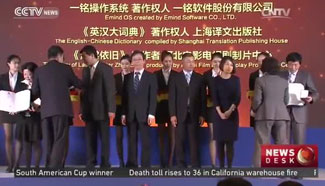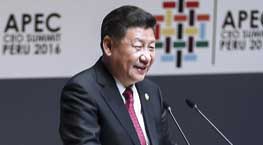by Mahmoud Fouly
CAIRO, Dec. 6 (Xinhua) -- The recent large currency swap deal between Egypt and China shows Chinese support for the Egyptian economy that has been suffering recession over the past few years, said Egyptian economists.
On Tuesday, the Central Bank of Egypt (CBE) and the People's Bank of China (PBC) signed a deal that is worth 18 billion yuan (about 2.62 billion U.S. dollars) to bolster economic growth in the North African country.
It allows the two institutions to exchange payments in one currency for equivalent amounts in the other to facilitate bilateral trade and provide liquidity support to financial markets.
ECONOMIC PUSH
Egypt has been suffering tough economic recession over the past five years of political turmoil and related security issues, which led to a growing budget deficit, ailing tourism, declining foreign currency reserves and shrinking local and foreign investments.
The recession led Egypt to devaluate its Egyptian pound in an attempt to limit the hike and shortage of the U.S. dollar required for imports.
The devaluation was encouraged by the International Monetary Fund (IMF) that delivered later in November 2.75 billion dollars to Egypt as the first batch of a 12-billion-dollar loan to finance the country's three-year economic reform program.
"The currency swap deal asserts China's support to Egypt. It is a very good deal that provides a good alternative for the U.S. dollar in mutual trade. So, it is a propitious chance to refresh the Egyptian economy," said Rashad Abdo, economics professor at Cairo University and also head of the Egyptian Forum for Economic and Strategic Studies.
The expert explained that it saves Egypt about 2.6 billion dollars that the government was going to withdraw from its CBE foreign currency reserves to pay off its necessary needs.
"So, it would have meant a 2.6-billion-dollar decrease of Egypt's foreign currency reserves without reaching this deal," Abdo told Xinhua, noting that the amount of yuan included in the deal will only be used within a specific government program to purchase certain goods necessary to boost the economy.
Egypt and China enjoy historical and growing bilateral relations since the Arab country was among the first to recognize and establish diplomatic relations with the giant Asian country in 1956. They both have been celebrating 2016 as the 60th anniversary of their diplomatic ties.
"China considers Egypt an ally and they both have very distinguished bilateral relations. The currency swap deal is expected to further develop a special relation between Egypt and China," said Gamal Bayoumi, head of the Arab Investors Union and chief of Egypt-Europe Cabinet Unit.
The economist added that instead of having the U.S. dollar as an intermediate currency between Egypt and China, the deal makes the local currencies of both countries sufficient for their mutual trade.
"The deal shows China's support for the Egyptian economic capabilities, as this credit line between them will encourage their direct mutual trade without having to wait for a middle currency," Bayoumi told Xinhua.
EXPORTS LEAP NEEDED
The bilateral trade volume between Egypt and China has increased from 6.8 billion dollars in 2011 to 12.9 billion in 2015. On Nov. 22, Egyptian and Chinese officials signed a cooperation protocol granting Egyptian grapes access to the Chinese market.
Since most of the trade volume is represented in Chinese exports to Egypt, experts believe that Egypt needs a huge leap in its exports that can be achieved through developing the Egyptian industry sector and studying the needs of the Chinese markets.
"Today, our annual exports are about 25 billion dollars while imports are about 77 billion. To create an actual balance of trade, our exports need to reach from 140 to 150 billion dollars. This is because about 75 percent of the components and materials of our exports are also imported," said Ali Wally, member of Egypt-China Chamber of Commerce and senior director of a Cairo-based management consulting firm.
"We need a real leap in exports," Wally continued, stressing that Egypt needs a qualitative change in exportation development methods to double exports by six times.
He noted that it's "a realizable dream" as annual exports of smaller countries in area and population like Turkey reach 144 billion dollars, Vietnam 162 billion, Malaysia 200 billion, Thailand 214 billion and South Korea over 500 billion.
"The deal is a good step that will alleviate pressure on the Egyptian pound, yet we need the export machine to work in full power to ease Egypt's dollar shortage and we need to have profitable investment opportunities to attract Chinese investors," the economist told Xinhua.
Most Egyptian economists highlight the need to turn investment opportunities into a reality to lure investors, such as facilitation of prepared lands with infrastructure for investors and faster licenses for their projects.
"Obstacles in investment environment in Egypt are complicated and they need full concentration and utmost effort to resolve them through a clear plan, identified goals and a specific timetable," Wally pointed out.
YUAN EXPANSION
The Chinese yuan has recently been included in IMF's Special Drawing Rights (SDR) basket and China is believed to be working on expansion of its local currency worldwide.
"China wants its currency to be among the strongest in the world and to compete with the U.S. dollar. This is why the yuan devaluation worries the West and the United States, as it increases Chinese exports to world markets," said Wally.
"So, Egypt has a good chance in its partnership with China, but it needs to double its exports, which can be achieved by providing big, profitable investment opportunities for Chinese investors," the economist told Xinhua.










